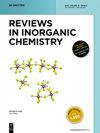Bioinorganic metal nanoparticles and their potential applications as antimicrobial, antioxidant and catalytic agents: a review
IF 3.1
3区 化学
Q1 CHEMISTRY, INORGANIC & NUCLEAR
引用次数: 0
Abstract
This review article covers the biogenic synthesis of metal nanoparticles (MNPs) having definite shape and size while using extract obtained from different biological sources such as bacteria, fungi, algae and plants. These biological materials are composed of chloroplast, thylakoid, different types of enzymes extracted from different biogenic sources, different phytochemicals such as phenols, flavonoids, and citric acid having functional groups such as sulfate, carboxyl, amino, amide and hydroxyl groups. These functional groups and enzymes act as efficient reductants to convert metal ions into metal atoms and alternatively metal atoms combine to form MNPs while long hydrocarbon chains present in these bio-macromolecules act as cage to stabilize them for prolong time. Effect of nature of source extract, different reaction conditions such as extract amount, salt amount and solvent used during MNPs preparation process have been critically discussed here in detail. Use of synthesized bioinorganic NPs in various areas including their effectiveness in fighting against bacteria, viruses, fungi, cancer, inflammation, and their potential role in catalytic reduction of environmental harmful substances into friendly products has also been described in a clear and concise manner along with their future consideration.生物无机金属纳米颗粒及其作为抗菌剂、抗氧化剂和催化剂的潜在应用:综述
这篇综述文章涉及利用从细菌、真菌、藻类和植物等不同生物资源中提取的提取物,通过生物合成具有明确形状和尺寸的金属纳米粒子(MNPs)。这些生物材料由叶绿体、类叶绿体、从不同生物来源提取的不同类型的酶、不同的植物化学物质(如酚类、类黄酮和柠檬酸)组成,具有硫酸根、羧基、氨基、酰胺和羟基等官能团。这些官能团和酶可作为有效的还原剂,将金属离子转化为金属原子,或者将金属原子结合形成 MNPs,而这些生物大分子中的长碳氢链则可作为笼子,使其长时间保持稳定。本文详细讨论了源提取物的性质、不同反应条件(如提取物用量、盐用量和 MNPs 制备过程中使用的溶剂)的影响。此外,还简明扼要地介绍了合成的生物无机 NPs 在各个领域的应用,包括它们在抗击细菌、病毒、真菌、癌症、炎症方面的功效,以及它们在催化还原环境有害物质为友好产品方面的潜在作用,并对它们的未来进行了展望。
本文章由计算机程序翻译,如有差异,请以英文原文为准。
求助全文
约1分钟内获得全文
求助全文
来源期刊

Reviews in Inorganic Chemistry
化学-分析化学
CiteScore
7.30
自引率
4.90%
发文量
20
审稿时长
1 months
期刊介绍:
Reviews in Inorganic Chemistry (REVIC) is a quarterly, peer-reviewed journal that focuses on developments in inorganic chemistry. Technical reviews offer detailed synthesis protocols, reviews of methodology and descriptions of apparatus. Topics are treated from a synthetic, theoretical, or analytical perspective. The editors and the publisher are committed to high quality standards and rapid handling of the review and publication process. The journal publishes all aspects of solid-state, molecular and surface chemistry. Topics may be treated from a synthetic, theoretical, or analytical perspective. The editors and the publisher are commited to high quality standards and rapid handling of the review and publication process.
Topics:
-Main group chemistry-
Transition metal chemistry-
Coordination chemistry-
Organometallic chemistry-
Catalysis-
Bioinorganic chemistry-
Supramolecular chemistry-
Ionic liquids
 求助内容:
求助内容: 应助结果提醒方式:
应助结果提醒方式:


